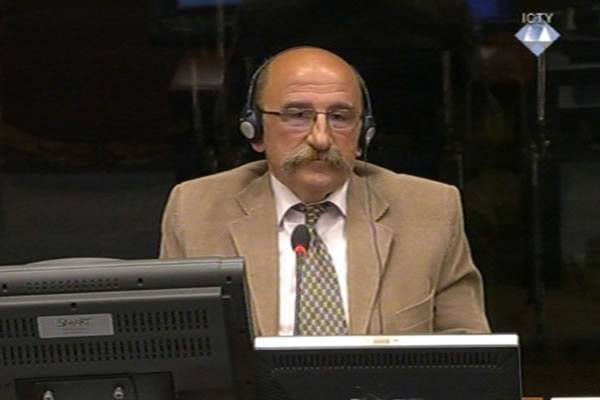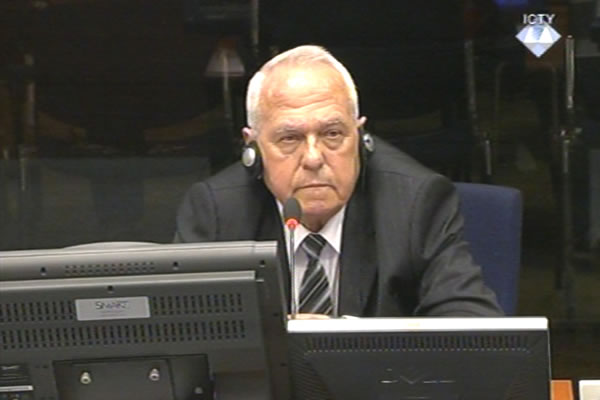Home
INTELLIGENCE OFFICER IN ‘SOAP BUBBLE’
Former chief of intelligence in the Drina Corps Svetozar Kosoric contends that he heard about the executions in Srebrenica some months after the crimes, from the media. Kosoric didn’t deny the prosecutor’s ironic suggestion that he had spent that time in a ‘soap bubble’ where the news about crimes couldn’t reach him. Former RS prime minister Vladimir Lukic began his testimony later today
 Svetozar Kosoric, defence witness of Radovan Karadzic
Svetozar Kosoric, defence witness of Radovan Karadzic Radovan Karadzic called as his witness Svetozar Kosoric Cica, a lieutenant colonel in the Yugoslav Army. Before the Srebrenica operation in the summer of 1995, Kosoric was transferred to the Bosnian Serb army and appointed chief of intelligence in the Drina Corps. In his evidence today, Kosoric turned out to be an intelligence officer without good intelligence. He strenuously denied any knowledge of the mass executions of Muslims in Srebrenica.
One of the few things Kosoric knows for sure is pertains to the claim made by Momir Nikolic, former security officer in the Bratunac Brigade, that on 12 July 1995, Vujadin Popovic, security chief in the Drina Corps had told him in front of the Fontana Hotel in Bratunac that the Muslim men would be separated from the rest of the people in Potocari and killed; Kosoric was there to confirm this. The witness said that neither he nor Popovic ever said anything like that. Also, Kosoric noted that he didn’t know there was a plan to kill the Muslim captives.
The prosecutor put it to the witness that he had been involved in the forcible transfer of Muslim civilians from Potocari and therefore had to know that the men had been separated from the women before their transport. The witness dismissed the suggestion. The prosecutor then noted that another witness called by Karadzic, Petar Usumlic, confirmed it in his testimony two days ago. Asked if it was possible that an ordinary civilian would know more than he, an experienced intelligence officer, did, Kosoric replied, ‘indeed, that was the case’.
Kosoric said he learned about the mass murders of the people from Srebrenica in September or October 1995 from the media that reported the statements made by international representatives. The prosecutor noted it was hard to believe that an intelligence officer would hear about the crimes in the area of responsibility of his corps from the media. Kosoric replied that the crimes were discussed in ‘bars and cafes’ but he didn’t put any store in the rumors. The prosecutor ironically suggested that learning about the crimes at that scale must have been an ‘unpleasant shock’ for the witness. ‘Yes, I was indeed terribly surprised’, the witness replied calmly. The witness then agreed with the prosecutor’s suggestion he must have been in a ‘soap bubble’ where the news about the developments in the corps could not reach him.
Kosoric had no problem defending himself by blaming others. Thus he said that ‘an important decision’ such as decision to execute the prisoners had to have been made in Ratko Mladic’s headquarters. Also, Kosoric was certain that his colleague in the Corps, Vujadin Popovic, was a ‘war criminal’. As Kosoric said, he was convinced the Tribunal’s judgment sentencing Popovic to life in prison was right. It’s worth noting that Kosoric appeared as Popovic’s defense witness in 2009. In August 1995, Kosoric was filmed in Rogatica being hugged by Popovic, who said, ‘here we are, war criminals’. Commenting on the footage, Kosoric said that Popovic was drunk. Kosoric told the prosecutor to detain him in The Hague if there was enough evidence for that.
Vladimir Lukic began his testimony in the second part of the hearing today. Until December 1992, Lukic was the Bosnian Serb representative in the UNPROFOR headquarters in Sarajevo, only to be appointed the prime minister of Republika Srpska. In his statement to the defense, Lukic said that the Serb artillery shelled only military targets in the city. Civilian facilities were only collateral damage or a result of ‘isolated acts of revenge’, Lukic explained. Prosecutor Gustafson showed the witness an UNPROFOR report from late 1992 indicating that every floor from the fifth floor up of the Sarajevo City Hospital building was hit by a large number of Serb artillery shells. The witness replied that he didn’t believe what the report said was true.
In his statement, Lukic tried to portray Republika Srpska as a well-organized state with the rule of law, where Karadzic and his SDS could not exert any influence on the workings of the government. This prompted the prosecutor to show Lukic a number of documents that indicate the party and its president had the final say in the employment policy in public companies. The witness didn’t feel this was strange at all. The government and the party for the most part agreed about personnel issues, he said. The prosecutor then presented a military intelligence document from August 1995, which shows how it functioned in real life: the document quotes Lukic as saying that at the beginning of the war former cabinet ministers Momcilo Mandic and Mico Stanisic had been selling VW Golf cars stolen from the factory in Vogosca on Karadzic’s orders. In was common knowledge that they had done it but it was never proven, Lukic said.
The former prime minister of the Bosnian Serb government continues his evidence on Tuesday.
Photos
Linked Reports
- Case : Karadzic
- 2013-05-22 WITNESS KNEW NOTHING
- 2013-05-22 PROVING WHAT DIDN'T HAPPEN IN MARKALE II
- 2013-05-21 PROSECUTION OFFERS ‘MORE LIKELY SCENARIO’ FOR MARKALE 1
- 2013-05-28 CREATING ‘NEW DEMOGRAPHIC PICTURE’ IN REPUBLIKA SRPSKA
- 2013-05-29 KARADZIC HIDES BEHIND BUILDINGS, SHRUBBERY AND FOG
- 2013-05-30 KARADZIC’S EXPERT: ENTIRE CITY OF SARAJEVO WAS NOT MILITARY TARGET

